This article is derived from Chengdu Food Tours. Chengdu Food Tours is a boutique culinary experience provider in Chengdu, focused on continually exploring this city as well as its history and food sources. They organize custom food tours and food events in the city itself and foraging trips in the mountains nearby. Chengdu Food Tours wants you to love Chengdu as much as we do, and food is the best place to start!
Baijiu is just one of those things that people don’t fall in love with when they come to China. It’s a strong astringent spirit distilled from sorghum (and/or millet, glutinous rice, corn, wheat or a combination) that hasn’t seemed to hit the western palate in the right way. While it is being discovered/introduced into, at least the US right now, there is still a barrier to entry for a lot of would be drinkers -generally the just don’t think it tastes good.
But for as long as there has been baijiu, people have been infusing it with medicine and/or fruit, to make its health benefits greater (because drinking excessively should always be easily excused by saying its medicine) and presumably making it more palatable for certain people.
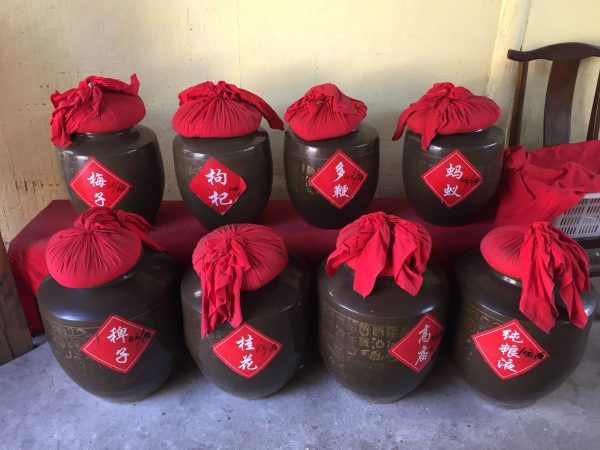
Families throughout Sichuan infuse their own baijiu at home in clay urns or glass jars, with local fruits, roots and herbs. Most restaurants in Chengdu either make their own infusions, or purchase them from farmers or producers that do. Every wet market in Chengdu has a booze section, where huge clay jars are filled with various grades and makings of baijiu, including a range of classic infusions.
The most traditional infusions, at least in Sichuan, are from plums (sweet), gouji berries and red dates (a bit spicier, and ‘good’ for you) and Chinese medicines (bitter), which can include anything from ginseng roots, to local herbs and grasses, to ‘tiger penises’ for you ‘man power’. Expensive substances such as Maca or Cordyceps, are also infused and drank as a healthy tonic, but in general most homes make simple infusions with local fruit to make it easier to drink. Infused Baijiu is a great entry point to learn about the spice and flavors of the worlds most consumed spirit, but in a easier-to-drink sort of way.
The good news is infusing your own baijiu is simple, and the products last for a long time. Since it’s cherry season here, we headed out the mountains in the Qiang area 120KM west of Chengdu and picked fresh red and pink cherries from the trees to use as our fruit.
HERE’S WHAT YOU NEED TO KNOW
1. Pick your flavor
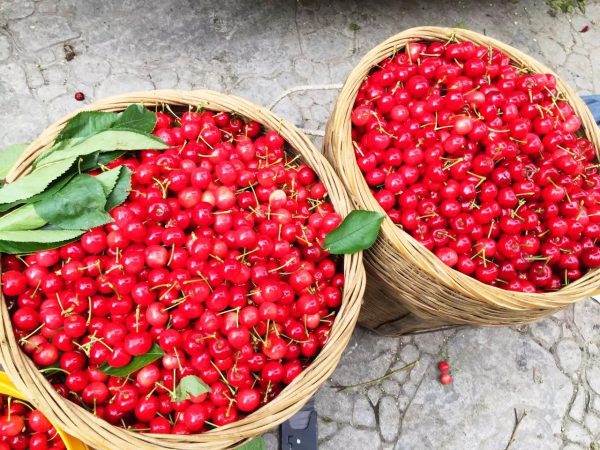
We chose cherries because they are local and in season and delicious. In general small, stone-fruits that aren’t too soft work well. The most common infusion is made with small Chinese plums. Other common infusions are gouji berries & red dates, or whole lemons. Soft, fleshy fruits don’t work as well in this style as they break down too quickly.
2. Pick your Baijiu
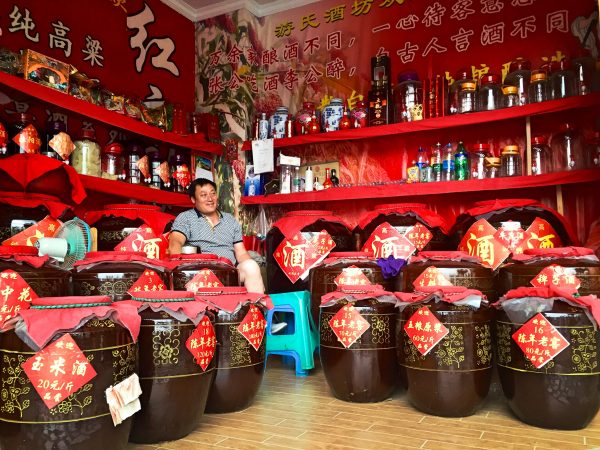
You will want a high percentage, non-flavored baijiu. In China these are most easily bought wholesale, by the litre at your local baijiu shop or wet market. Outside China, pick a light scent, mid-range biajiu. It doesn’t need to be fancy, but something too cheap could carry undesirable flavors with it as well.
3. Get your materials
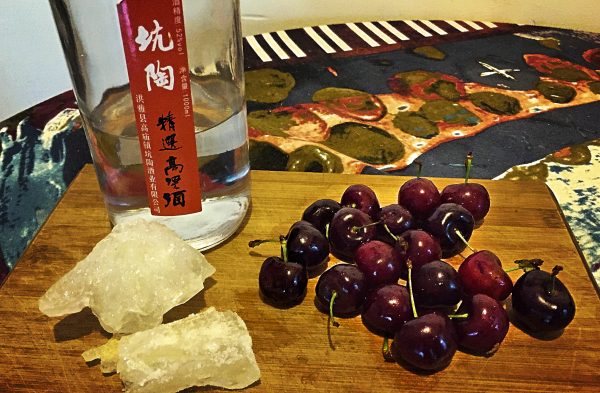
- 1 sealable, air-tight jar
- fruit
- baijiu
- rock sugar
- time
4. Put it together
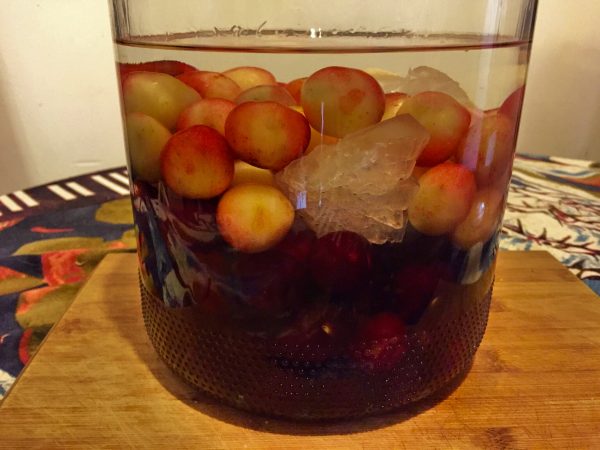
In Sichuan we don’t like to over-complicate things with a lot of measurements and rules, but there are some best practices.
- wash and de-stem fruit, but don’t peel, pit or slice
- put your fruit in the jar
- add enough alcohol to cover the fruit (if you want it stronger add a bit more)
- add a couple rocks of rock sugar (again, if you want it sweeter add more). The sugar sweetens the spirit and also helps break down the fruit and access its juices.
- seal the jar and leave in a cool shady place
5. Wait
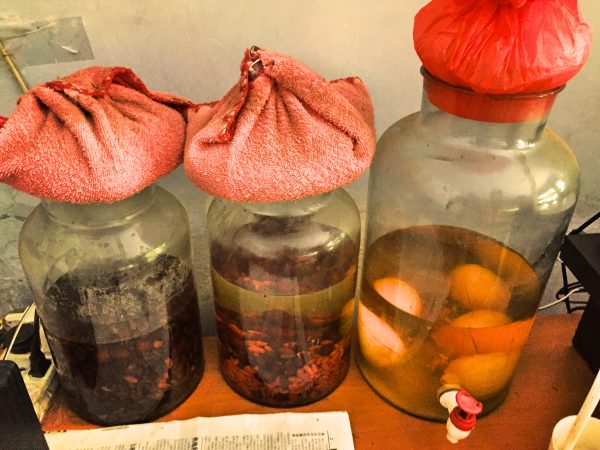
This is the easy part, but also the hard part. The whole-fruit Chinese style means that the fruits like Cherries will have to infuse for longer, up to a month to get the best flavors, but can be kept in the jar for up to a year.
If fruits breakdown, or if you decided to chop fruit or user softer fruits (like peaches) you will want to infuse for a bout a week, then strain out all the particulate that could go rancid.
Feel free to taste along the way, and see when it achieves your desired sweetness/tartness/strength.
6. Enjoy/Have a party
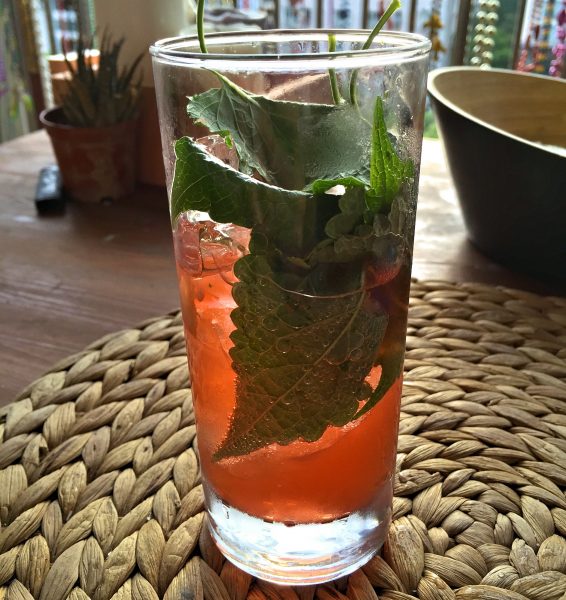
(Cherry Infused Baijiu with Local Herbs)
Because you shouldn’t drink alone, and because you will want to show off your Chinese-infusions to your friends. But be warned, don’t let the fruittiness or sweetness trick you, if you’re not used to drinking baijiu, it can get on top of you pretty quickly.
Let us know what you think, what great infusions you made, or what great cocktails you made with your results!
Infusions go great with food, or after dinner, and Chengdu Food Tours regularly sample local mixes on the food tours.












